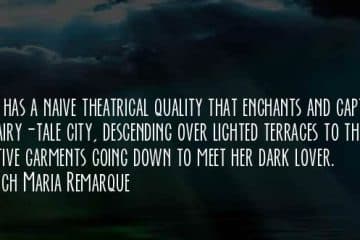 Brief summary of Blackberry Winter “Blackberry Winter” was once called the cold snap (up to precipitation in the form of snow) at the end of spring. In Sarah Gio’s novel, the unexpected return of winter symbolizes the grief that befell the main character at the moment when she least expected it. According to Sarah Gio herself, blackberries have always meant a lot to her. Berries reminded me of carefree childhood and summer afternoon walks when the whole family of the future writer went to the forest and picked blackberries.
Brief summary of Blackberry Winter “Blackberry Winter” was once called the cold snap (up to precipitation in the form of snow) at the end of spring. In Sarah Gio’s novel, the unexpected return of winter symbolizes the grief that befell the main character at the moment when she least expected it. According to Sarah Gio herself, blackberries have always meant a lot to her. Berries reminded me of carefree childhood and summer afternoon walks when the whole family of the future writer went to the forest and picked blackberries.
One day, while driving in a car with her sons and her husband, Sarah heard a very beautiful song on the radio, the name of which was not known to her or any of her family. It turned out that the song was called “Blackberry Winter”, and it was performed by Hilary Cole. The unusual title and beautiful melody impressed the writer so much that she decided to find out what this strange phrase means, and by all means write a book with the appropriate title.
Vera Ray is a single mother from Seattle. A woman is forced to combine the duties of a mother with a night job in a hotel. That spring evening in 1933, everything was as usual. Vera kissed her son, put him to bed, and went to work. Seattle was covered in snow this morning. Upon returning home, Vera found that little Daniel was missing. No traces of the boy, except for Daniel’s favorite toy, was found not far from the house, Vera could not find it. Mother is not going to give up and resign herself. She is confident that she can find her son.
Sarah Gio Bramble Winter Faith never managed to find the missing child. The woman died during her search. Nevertheless, Vera was convinced that her son was alive, and left him a farewell letter and Max’s favorite teddy bear in his children’s hiding place.
The story of Vera Ray receives its continuation in the new millennium. Contemporary Seattle journalist Claire Aldridge is going through a family drama. She lost her child and quarreled with her husband. Work becomes the only way to forget. History repeats itself: blackberry winter has returned to the city. Claire is given the task of writing an article about it. While working on the article, Aldridge learns that about 80 years ago, a similar natural disaster occurred in Seattle. In addition, Claire learns that during a storm, a woman named Vera Ray unexpectedly lost her child. The journalist takes on the investigation of a mysterious story.
Aldridge was able to track down Vera Ray’s son. It turned out to be Claire’s husband’s grandfather, the honorary editor-in-chief of the publication in which the main character works. The disappearance of the boy was not a tragic accident or the work of random people. Vera’s mother was once the nanny of Josephine Kensington, a girl from a wealthy family. Little Josie hated her nanny. But even more, hatred came when Josephine’s brother fell in love with Vera. Despite the mutual love of young people, the Kensingtons were opposed to the rich heir marrying a poor girl.
 Sarah Gio’s novel Blackberry WinterVera became a single mother. But Josephine couldn’t just leave Miss Ray alone. Her brother’s son could not live in poverty. “Caring” Aunt Josie kidnapped her nephew and brought her to her brother, who was involved in charity work, without saying that Daniel was his own son. Josephine told the truth after Vera’s death. One day, little Daniel, who received the new name Warren, accidentally overheard the conversation of his parents. The woman, whom he considered his mother, claimed that the boy’s academic failures were due to bad genes inherited from Vera. Not knowing what genes are and who Vera is, Warren very quickly forgot what he had heard. Many years later, Aunt Josie, already on her deathbed, confessed her crime to her nephew. However, relatives who were next to her at that moment informed Warren that her aunt’s words should not be taken seriously. She is too sick and perhaps delirious. Warren suggests that Josephine is involved in his mother’s death.
Sarah Gio’s novel Blackberry WinterVera became a single mother. But Josephine couldn’t just leave Miss Ray alone. Her brother’s son could not live in poverty. “Caring” Aunt Josie kidnapped her nephew and brought her to her brother, who was involved in charity work, without saying that Daniel was his own son. Josephine told the truth after Vera’s death. One day, little Daniel, who received the new name Warren, accidentally overheard the conversation of his parents. The woman, whom he considered his mother, claimed that the boy’s academic failures were due to bad genes inherited from Vera. Not knowing what genes are and who Vera is, Warren very quickly forgot what he had heard. Many years later, Aunt Josie, already on her deathbed, confessed her crime to her nephew. However, relatives who were next to her at that moment informed Warren that her aunt’s words should not be taken seriously. She is too sick and perhaps delirious. Warren suggests that Josephine is involved in his mother’s death.
Claire learned a shocking family secret from Daniel himself, who did everything possible to keep the scandalous story from becoming public. Claire finally managed to improve relations with her husband. The loss of a child alienated them from each other, but this misfortune remained in the past. They have a new life ahead of them.
Analysis of the work
Composition of the novel
Composition of the novel One of the main features of the work is the presence in the novel of two main characters who themselves tell their stories. Thanks to the first-person narrative, the reader has the opportunity to take part in the development of events. The absence of the “ubiquitous” author, who knows the end of the story in advance, helps the audience to remain in suspense until the last page, to speculate. To confuse the reader, Gio leads his heroine on a false trail. By the end of the novel, there may be an erroneous belief that the missing Daniel was Thomas Kensington, who had already died by the time of the investigation.
The novel begins with the story of Vera. Then there is a movement in time for 80 years ahead. Two women living in different eras, having different destinies and different levels of material wealth, were united by common grief – the loss of a beloved child. A reminder of a nightmarish story from the past is a snowstorm that suddenly began in late spring. Another lost child (this time, forever) is the great-grandson of Vera Ray.
Theme and idea
The theme of motherhood, touched upon in the novel, is very close to Sarah Gio. The woman became the mother of three sons. Work on the book took place during the third pregnancy. Gio claims that despite the fact that she did not suffer the misfortune that united Vera and Claire, she felt all the emotions of her heroines, and managed to be in their place.
Writer Sarah GioYou can also read You can also read the biography of the writer Sarah Gio, whose two books became world bestsellers and brought her wide recognition.
Another book by Sarah Gio, “Violets in March”, very clearly shows how the events of many years ago affect our lives in the present.
The idea of the novel was the joy of motherhood, which, to the great regret of the author, not every woman with a child was able to realize. Being a mother, according to Gio, is the highest good, incomparable either with career growth or with social recognition, which today’s women are so striving for.
Reader reviews
The main critics of the works of modern authors are not literary critics, but ordinary readers who do not have the appropriate education, but who have learned to penetrate each new novel with their heart and soul.
Criticism of the work
To many readers, Sarah Gio’s book seemed too banal and predictable. And someone, on the contrary, considered the plot of the novel fantastic and overflowing with some mysticism. The main characters do not always evoke positive emotions.
And if Vera in most cases becomes the object of sympathy, then Claire can easily cause irritation. The suffering of Ray, who lived in the dysfunctional 30s, cannot be compared with the suffering of Aldridge, who has a wealthy husband and a good job. Some of Claire’s actions seem irrational. A young woman constantly avoids constructive dialogues with her husband, she herself alienates him from herself, in her soul not wanting a divorce. Aldridge’s investigation seemed implausible to many readers. The evidence, critics believe, appears on its own. The traditional “happy ending” was a big disappointment for those who expected a more tragic and poignant ending from the novel.







I was impressed by this book by how the author coolly connects two stories at different times. Very sensual and inspiring, for me, some things in this work were so unexpected that I could not tear myself away and read the pages until the morning, just an incredible story that I recommend to read to all people who just like to spend a good evening behind the pages of a good book! Thanks also for the cool review of the authors of the site!